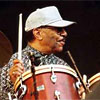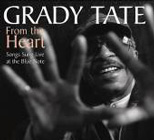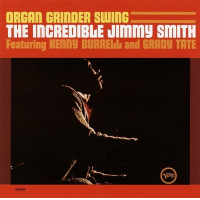Home » Jazz Articles » Grady Tate
Jazz Articles about Grady Tate
Dorothy Ashby: With Strings Attached, 1957-1965

by John Chacona
Imagine if Sidney Bechet, Charlie Christian and Jimmy Smith were barely remembered and recordings of their music were long unavailable and known only on the geekiest corners of Discogs. That is essentially the status of harpist Dorothy Ashby. Like the three figures cited above, Ashby essentially created a language for her chosen instrument, the harp, where virtually none has existed before and established it as a legitimate and expressive vehicle for jazz improvisation at the highest level. Just how brilliantly ...
read moreGrady Tate: The Art of the Singing Drummer

by Greg Thomas
Grady Tate, 76, is best known as one of the most beloved, consistently dependable session drummers since the 1960s. He's the steady pulse on the famous version of Benny Golson's “Killer Joe," from Quincy Jones' Walking in Space (Verve, 1969), where his hi-hat groove and snare drum rim shots on the four, in tandem with bassist Ray Brown's big-toned walking, formed the backdrop for the head and solos by Hubert Laws and Freddie Hubbard.He was the house drummer ...
read moreGrady Tate: From the Heart: Songs Sung Live at the Blue Note

by Greg Thomas
Grady Tate, likely the most recorded trap drummer in history, has played with many a great singer: Tony Bennett, Ella Fitzgerald, Aretha Franklin, Peggy Lee and Sarah Vaughan--and that's just a few. But Tate himself has been one of the best jazz vocalists on the scene since his 1968 recording Windmills of My Mind. This past New Year's Eve, at a brunch gig at the Blue Note, he performed an exhilarating set which included tunes from From the ...
read moreJimmy Smith: Organ Grinder Swing

by C. Andrew Hovan
It was through his early work on Blue Note that the world-shattering innovations of Jimmy Smith first reached the record buying public. Pure be-bop was the order of the day and aside from a special guest or two thrown in from time to time, Smith worked mainly in a trio context. Then the organist left for Verve Records and producer Creed Taylor broadened Smith's horizons by recording him with large ensembles, not to mention getting him to add a bluesy ...
read more


















